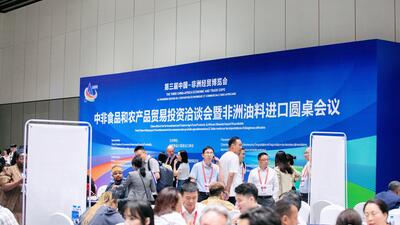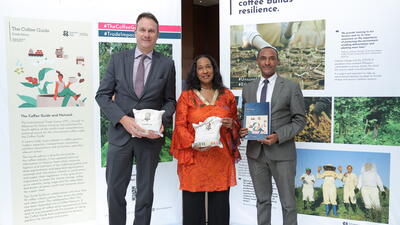
ITC panel: trade facilitation remains key to SME export success
The growing importance of regional and global value chains in international trade provides a unique opportunity to increase exports of small and medium-sized enterprises (SMEs) through their integration into these value chains, according to panellists at a side event organized by ITC at the Ninth World Trade Organization (WTO) Ministerial Conference in Bali, Indonesia earlier today. However, without the proper measures in place that simplify cross-border trade, SMEs cannot be competitive in the global marketplace, “so we are urging ministers next door to pass the Trade Facilitation Agreement,” said ITC Executive Director Arancha González, who moderated the discussion. “Trade facilitation is the bread and butter of small and medium sized enterprises,” she told the audience.
Thanks to the emergence of value chains, SMEs can now engage in global trade flows without the need to be competent in all aspects of the production of a final output. There is, however, a lot of work to be done in creating the conditions that are conducive to exports by SMEs: Over a third of businesses consider problems with the business environment to represent a major constraint on exports, according to a survey of exporting SMEs conducted by ITC last month.
Rwanda showing the way
Some countries have taken major steps in improving the export competitiveness of their companies. In the World Bank’s Doing Business Report 2014 Rwanda has been ranked 32nd out of 189 countries for ease of doing business, up from 52nd place the year before. Regulatory reform is the key reason behind the improvement in the ranking, said François Kanimba, Rwanda’s Minister of Trade and Industry. Property rights have been strengthened and administrative processes simplified, Mr. Kanimba told the audience. “It takes a day or less to register a new business and it can be done online, including by foreigners,” he said.
Access to finance tends to be the main obstacle SMEs face when trying to grow their businesses, so the government has set up lending institutions in every village and put in place a nationwide credit information system, which lowers banks’ risks and thereby increases lending, he said.
At the same time, transport infrastructure remains poor, and a single-window system to ease customs processes has been introduced at only a third of border posts, he said. “We clearly have more work to do,” Mr. Kanimba said.
Developing countries need to concentrate on three areas in order to facilitate the integration of their businesses into value chains, said Alexander Stubb, Minister for European Affairs and Foreign Trade of Finland, quoting from his countries' experience. They need to create the right business environment to attract foreign direct investment in order to foster linkages with multinationals on the ground; they need to provide intellectual property protection to encourage innovation; and they need to facilitate the creation of a functioning services sector that can provide the business services manufacturers need.
Trade facilitation lies at the core of global value chains, which require goods to cross borders several times during production, he said. “We need to do away with the old mercantilist thinking that exports are good and imports are bad,” he said “and instead think in terms of international value chains.” As an example, he cited Finish telecommunications equipment maker Nokia, whose smart phones include pieces manufactured in 12 different countries.
Developing-country SMEs often have to bear inordinately high costs of complying with customs and border procedures and other non-tariff measures (NTMs), rendering them uncompetitive as suppliers and impeding them from integrating into regional and global value chains, as members of another panel discussed.
Not tariffs, NTMs
Government negotiators should focus on logistical challenges, such as non-tariff barriers, which have taken over the role of tariffs in limiting international trade, said Stefano Arganese, CEO of DHL Freight Central Eastern Southern Europe, the Americas, Middle East and Africa. “The correlation between trade and logistics is extremely strong, particularly in intermediate goods” traded within value chains, he said. He cited research by the World Economic Forum, showing that reducing supply chain barriers to trade could increase global GDP six times more than removing all remaining tariffs.
A deal on trade facilitation would be particularly beneficial for poorer countries, Mr. Arganese said. “Developing countries have much higher trade costs than developed countries. Trade facilitation needs to reach a certain level for investors to set up shop in a country,” he said.
While Rwanda has improved its “soft” infrastructure impressively over the last few years, lack of adequate transport infrastructure means that moving a container from the Kigali, Rwanda to the nearest port in Mombasa, Kenya costs as much as moving the container from Mombasa to Shanghai, China.
Trade support to the rescue
Not only governments, but also business associations can play a supportive role in enabling SMEs to join regional and global value chains, said Mulu Solomon, President of the Ethiopian Chamber of Commerce and Sector Associations. Low productivity, quality problems, ability to deliver on time, lack of familiarity with customs processes are just some of the capacity issues SMEs face, she said.
The Chamber provides training on various subjects including tax issues and market research, she said. It has also engaged in dialogue with the government to simplify licensing and business registration and customs formalities. Regulations have been changed as a result, and the government is currently working on the introduction of single-window customs procedures to decrease the administrative burden and trading costs of businesses.
First and foremost, SMEs need to identify the niches where their competitive advantages lie and then focus on these narrow segments, said Enrique Ortiz, General Manager, of Costa Rican electronics contracts manufacturer Camtronics, which has successfully integrated into the value chains of several multinationals in the telecommunications, medical devices, aerospace and industrial controls sectors. “We learned this the hard way, through our own mistakes,” he said. Once part of supply chains, companies need to continue to innovate, so that they can move up the value chain. “You cannot compete on price alone for long,” he said, recalling his experience from the early 1990s, when manufacturers from the United States began outsourcing to China.
In order to join value chains, SMEs need to be able to convince multinationals that they can offset the trade costs such as freight, customs broker fees and administrative burdens, he said. The lower these costs, the easier it is for SMEs to join value chains, he said.
A key facilitating role governments can play is to build the image of their country as an outsourcing destination and create a supportive environment for foreign director investment, Mr. Ortiz said. “I used to think that having excellent performance is enough” to attract clients and investors. “But I then discovered that this is expected anyway. The infrastructure and the general technical know-how of local businesses are what motivate [investors] to move forward with an investment plan,” he said.
More technical assistance needed to overcome trade barriers
There is a strong need for technical assistance to address the business implications of NTMs not only in goods but also in services to improve overall competitiveness.
ITC will continue to assist SMEs in developing and transition economies in their efforts to integrate into regional and global value chains, Ms. González said. ITC works with policymakers and trade support institutions to promote trade policies and regulations that create an SME-friendly business environment. This includes the facilitation of private-public dialogue in the preparation of trade policy.















